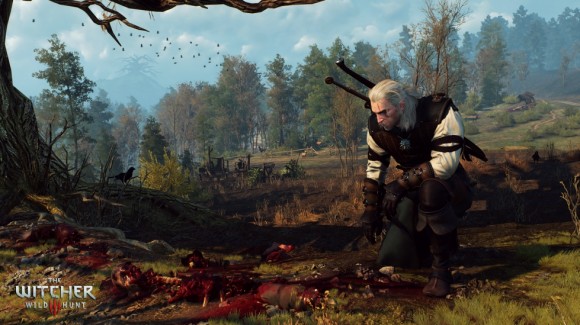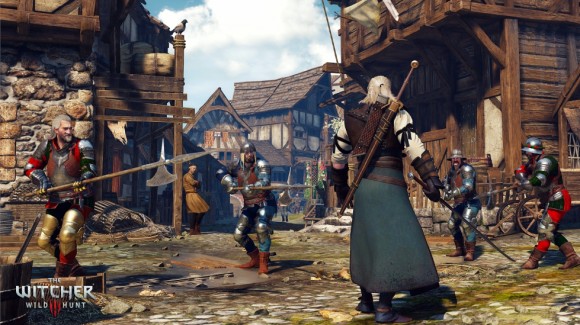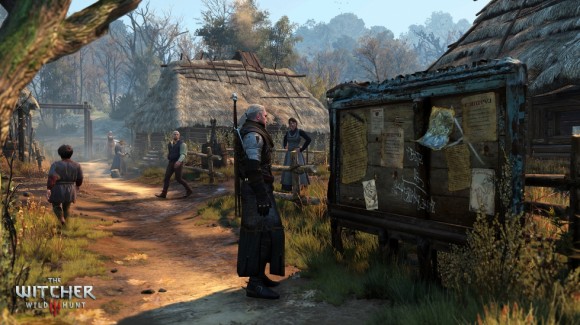Back in the long, long ago of two thousand and eleven a game by the name of Skyrim came out and it made enough money to basically make its publisher, Bethesda, a G20 country. Fellow AAA WRPG makers decided that because of Skyrim’s success, every game now needs to be open world, despite the fact that The Elder Scrolls has been open world for decades and had plenty of time to perfect the model. The results of people imitating Skyrim have rarely been stellar. There is a magic to making a fun open world game that not every company can produce. Perhaps the best example of this was Dragon Age: Inquisition, where the open world nature of the game only really worked to dilute what was so good about its predecessors. On the other hand, if you want to look at a game that shows how to make the transition to open world gaming right, then The Witcher 3 is an excellent example of this, and an excellent game in general.
The Witcher 3: Wild Hunt picks up six months after the ending of The Witcher 2. Geralt, now with his memory restored is on the trail of Yennefer, the woman that was the love of her life prior to his amnesia. The game picks up as Geralt is getting close to his goal, however, the key piece of information he needs to obtain belongs to a man who of course wants a favor in exchange for it. Luckily for the player, this favor is killing a griffin. The plot is perhaps one of the strongest parts of the Witcher 3. While the premise is not something particularly original, the execution of the storytelling is excellent. The dialogue is well acted, and adequate enough to bring to life the well written characters, and did a lot to keep me engaged while making me want to push through the story. Perhaps the only problem in it is that the urgency implied by the plot clashes with the open world game play at the core. I need to find a certain character soon because she might die? Forget that, I need to go find someone’s skillet.
It is a common occurrence in open world RPG’s that there might be a difference in quality between the main story and the side quests. Some game series’ are famous for having a short and boring main quest paired with a myriad of fun quality side activities. The opposite has also been true of other game series’, keeping the real fun in their story and having side quests that can only be described as painful. The Witcher 3 manages to have interesting, engaging quests for the side quests and the main quest as well. Granted, not all of them are winners. You really do have to look for someone’s skillet, but at least is really close by and you don’t have to drive across the map and kill a predetermined number of enemies for it. The quests are usually self contained stories, some which stem from the main quest, others which spawn follow up quests on their own. Many times the story lines of the quests lead you to unexpected places and become more involved than expected.
Fear not, if you like questing for things to fetch, the crafting system is back. There are many unique weapons and armor that you can craft provided that you find the schematics, the correct type of smith at the correct level, and have the correct materials. This will have you raiding peasant’s residences for every amount of scrap that you can find. Due to the sheer amount of items there are and fact that witching seems to be a poorly paid profession, you will have to learn what the rare items worth holding on to are, and what you can safely sell. It is very easy to get overburdened very quickly if you try to hold on to all the crafting components and the regular items that can be dismantled to get more crafting components. In addition to usable items, books, and alchemy components, there is also equipment, and the trophies of your kills you have to keep track of. Pro-Tip: upgrade your saddle bags as soon as you can.
Gamplay has been streamlined even beyond what we saw in The Witcher 2. Geralt automatically replenishes any potions you have used while he is meditating, and no longer requires meditation to level up or brew new potions. The combat follows the model set up in the Witcher 2, but seems to be easier once you get used to rhythm of the battle. Fans of the first two games concerned about the decrease of this needless complexity should not fear. The Witcher 3 can still be as unforgiving as previous installments. Sure, it is hard to lose to your average group of bandits during the game, but during quests and contracts running blindly into the fights will certainly result in your demise unless you are much higher level than the quest requires. Combat is still about preparation. The use of oils and potions, as well as the occasional bit of research is necessary for many of the monsters. For the most part I feel that the changes make the game better. A lot of the complexities of the systems in the last games just resulted in tedious busy work, and the removal of that makes it easier to focus on the meat of the game.
The trade off for the game being open world is that it doesn’t look as nice and detailed is the previous entry into the franchise. It still looks great, but it doesn’t look quite as tight as other games. There have also been strange animation glitches, normal in open world games. The glitch reported by Jared where you can send enemies into orbit is hilariously still there, but it is very rare. With each update this game has hit these bugs have become less common. I personally haven’t run into anything game breaking or anything that has crashed my game since the first patches came out, so make sure your game is patched up when you play it. People who have played this on a PS4 with a disk have reported that the game has very long loading times. I have not been able to confirm this as this was written on PC code, but be aware of that if you play to buy it on the PS4.
The best parts of the series are still there, and mercifully unchanged by the leap to open world. There is still an interesting gray tinge to the moral choices you make, and in some instances far reaching consequences that do not become evident until several game time hours after you have made the choice. As before, the game doesn’t really judge you for the decisions you take. There is no morality system of points that keeps a tally of what you did. It is rather based on choice and consequence. As it is the tradition in the Witcher games, you never know if you made the right decision or not. It is also oozing with atmosphere. While other games set in medieval Europe always seem to be sanitized The Witcher 3 has lived up to the promises they made leading up to the game’s release. It does as much as a living world as other open world games I’ve seen. It’s the details that sell this. When you wake up in a village, characters are usually active doing something rather than just standing around looking at the horizon, or the wall of the building in front, and goes a long way towards making the world feel genuine.
The Witcher 3 accomplishes everything it sets out to do and more, and at least where I am concerned it has somehow managed to live up to the enormous amount of hype that was created during the marketing process. If you are a fan of the first two games, you are guaranteed to love it. I would also recommend that you pick this up as a fan of WRPG’s in general. Not only is the Witcher 3 long and full of content but most of it is of high quality, and worth seeing. In a time where where are getting quality WRPG’s in a fairly regular basis, the Witcher 3 seems to be a step above the rest. Even if you haven’t played the first two games, or even if you are not generally into WRPG’s I would recommend that you at least find a way to give it a shot. It is bound to keep you busy for a long, long time.









